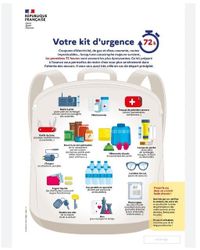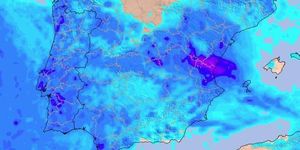In a significant move reflecting growing concerns over potential conflicts in Europe, the European Commission has issued a recommendation urging citizens to prepare survival kits capable of sustaining them for at least 72 hours without external assistance. This advice comes amidst fears of possible territorial aggression, particularly regarding the Spanish enclaves of Ceuta and Melilla, which are situated on the northern coast of Africa and bordered by Morocco.
As tensions rise, Spain has responded proactively by endorsing the Commission's advice. The recommendation is part of a broader initiative to prepare European nations for various crises, including natural disasters, pandemics, cyberattacks, and armed conflicts. The urgency of the situation is underscored by the fact that Sweden has already taken steps by distributing a guide detailing how citizens should react in the event of a crisis or military attack. Similarly, France has published its own survival manual, instructing citizens on how to navigate under what it describes as a "threatening threat."
Retired Spanish Admiral Juan Rodríguez Garat has voiced his support for these measures, pointing out the necessity of being prepared for cyberattacks or infrastructure sabotage, which could potentially disrupt access to essential services like ATMs. He stressed that, "It is a precautionary measure so we understand that we are vulnerable and that we are prepared to face these eventualities."
The survival kits recommended by the European Commission should include a variety of essential items. Key components are drinking water, non-perishable food, essential medicines, a first aid kit, a flashlight, identity documents, cash, clothing, and blankets. Additionally, useful tools such as a pocket knife, lighter, and spare keys are advised to ensure individuals are adequately equipped to handle emergencies.
This proactive stance by the European Commission and member states reflects a heightened awareness of the geopolitical landscape, particularly in light of historical tensions in the region. The fear of Morocco's ambitions towards Ceuta and Melilla has been a longstanding concern for Spain, and the current recommendations highlight the seriousness with which these fears are being addressed.
Moreover, the ongoing geopolitical shifts and conflicts across Europe have prompted nations to rethink their emergency preparedness strategies. The recommendation to maintain survival kits is a stark reminder of the unpredictable nature of international relations and the potential for rapid escalation into conflict.
In recent years, Europe has witnessed a surge in crises that have tested the resilience of its nations. From the COVID-19 pandemic to increasing cyber threats, the continent has faced numerous challenges that have exposed vulnerabilities in its infrastructure and emergency response systems. The European Commission's latest guidance is a response to these challenges, aiming to empower citizens to take charge of their safety.
As citizens across Europe consider the implications of these recommendations, there is a palpable sense of urgency. The idea of needing to survive without external help for an extended period is daunting, yet it is increasingly becoming a reality that many are preparing for. The survival kits serve not only as a practical measure but also as a psychological tool, instilling a sense of readiness in the face of uncertainty.
In addition to the physical items recommended, the emphasis on mental preparedness cannot be overlooked. Understanding how to react in a crisis situation is just as important as having the right supplies. The guides being distributed by countries like Sweden and France aim to educate citizens on situational awareness and effective response strategies.
As the situation evolves, the dialogue surrounding emergency preparedness is likely to continue. The European Commission's advice serves as a catalyst for discussions on national security, civil preparedness, and the responsibilities of governments to protect their citizens. The call for survival kits is not merely a practical suggestion; it is a reflection of the times we live in, where uncertainty looms large.
In conclusion, the European Commission's recommendation for citizens to prepare survival kits highlights the pressing need for readiness in an increasingly unpredictable world. As Europe grapples with the implications of potential conflicts, the emphasis on self-sufficiency and preparedness is more relevant than ever. The steps being taken by nations to educate and equip their citizens indicate a collective recognition of the need for vigilance in the face of uncertainty.





